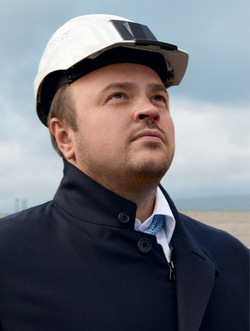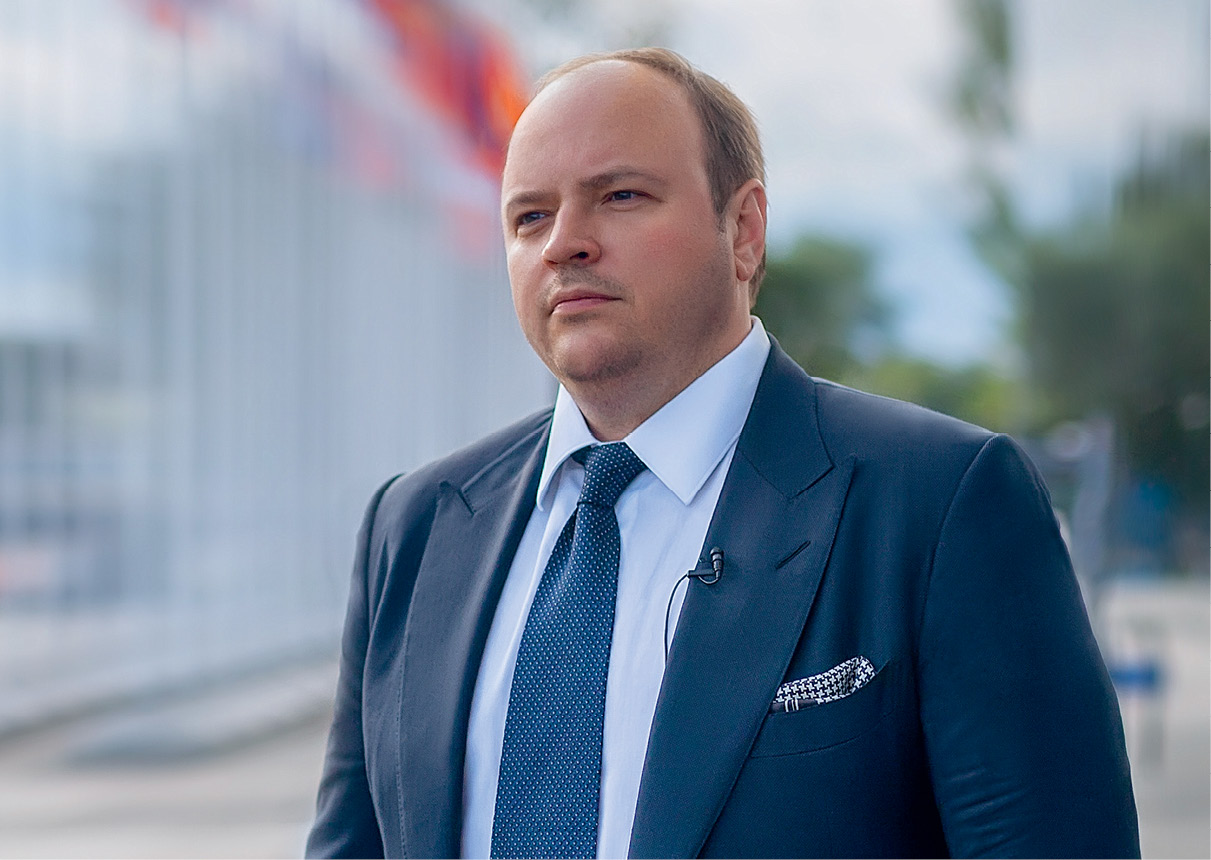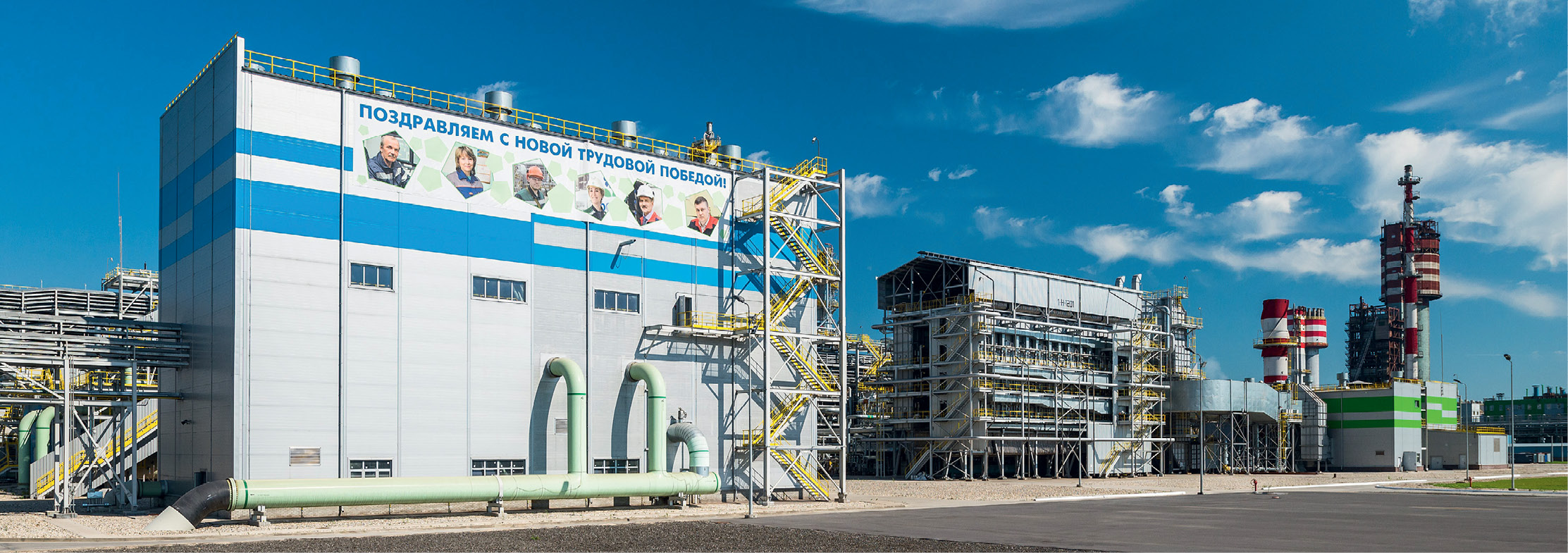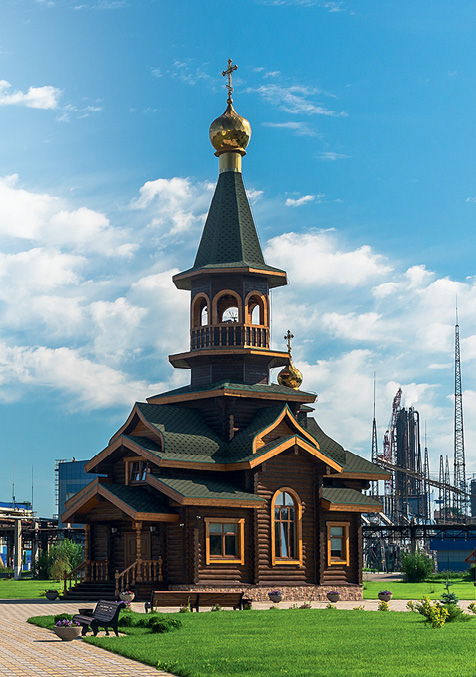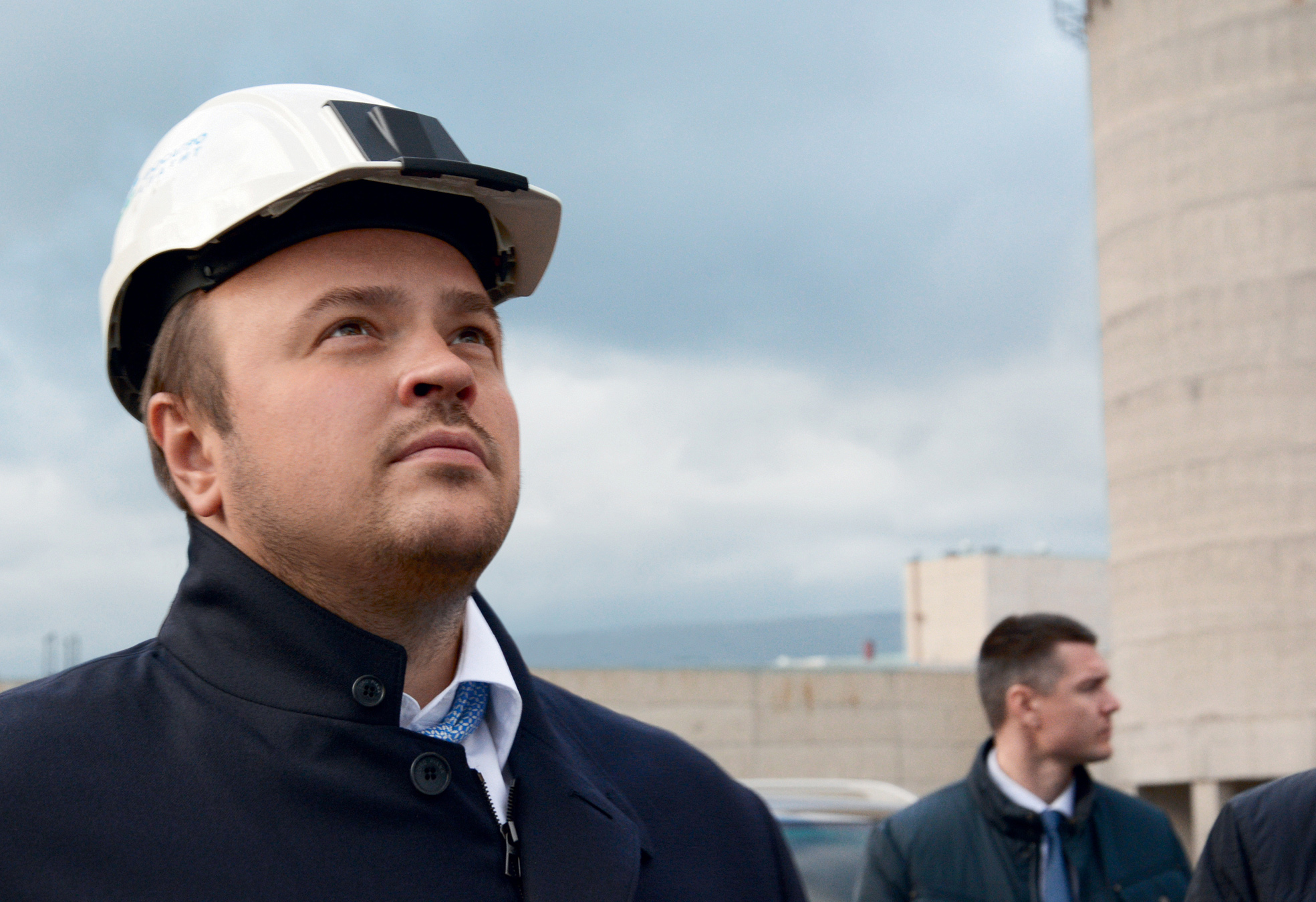FOR EVERY FRUIT OF EARTH
AS HE ENDEAVOURS TO BUILD A MOST EXCEPTIONAL AND EFFICIENT COMPANY, HEAD OF PHOSAGRO ANDREY GURYEV HAS COMPLETE FAITH IN RUSSIA'S BRIGHT FUTURE AS AN AGRICULTURAL SUPERPOWER THAT WILL FEED THE ENTIRE WORLD WITH WHOLEFOOD. ON HIS PART, HE IS KEEN TO GIVE EVERY FRUIT OF THE EARTH THE NUTRITION IT NEEDS.
To summarise the primary goal I’m pursuing as the head of PhosAgro, I would put it like this: I seek to build the most exceptional and efficient company in Russia in terms of returns, quality of assets and management, and trust of minority shareholders. One of the pillars here is our Board of Directors, with its structure and composition speaking volumes about the quality and principles of operations across the Company. About what we are and what we live by.
Seven out of ten directors on PhosAgro’s Board are independent. Such proportion is rare for the Russian market, but it is of major value for us as a company. In the first place, it fuels investor confidence and shows that the Company enjoys independent governance upon the whole. Secondly, it proves that the Company is governed by professionals, in line with global best practices.
All our directors are highly competent and held in high respect. Let me introduce three of them, well-known as public personalities. Jim Rogers, a legendary investor. Irina Bokova, who formerly served as the Director-General of UNESCO for eight years. And Xavier Rolet, the former CEO of the London Stock Exchange Group, who became Chairman of PhosAgro’s Board of Directors in 2019.
I would say that having these people on the Board is the best illustration of our public nature: they are familiar to the general public, they have loads of personal and professional experience, and they are held in great esteem globally. It would be essential for any publicly traded international company seeking to see its market cap grow, such as PhosAgro. All of them have a very thorough understanding of our business, and they are our ambassadors across the globe, representing not only PhosAgro but also the entire Russia. Each of them has made their own contribution to the Company.
We first met Jim Rogers in 2014, by some good fortune. Back then, we were looking for a good independent director. We made an emphasis on better corporate governance in our strategy right from the start, and we needed strong people. I felt Jim was really keen to try it, even at an early stage of our discussions. Agriculture, a business he knows well, is characterised by solid long-term upward trends, such as rapid global population growth and a shift in the diet paradigm, with rice becoming a side dish rather than a main course having a multiplier effect across the food production chain, and so Jim found our offer quite interesting.
After a closer look at the Company, at us personally, and at our values and plans, including PhosAgro’s focus on maximising profits, market cap, and sales, Jim agreed to become an independent director on our Board. At my request, he soon shared his first advice: to never listen to his advice. Some time later, Jim admitted his initial recommendation had been a bit misleading, with its ban for heeding his further tips.
Of course, Jim’s contribution to the Company’s operations was much more than just advice from the very start. He brought to the table his experience and numerous ideas. For example, as the head of the Remuneration and Human Resources Committee, he put a lot of effort into enhancing the Company’s incentive system. He was really interested in that. And he wanted to see people in their everyday life and work, from rank-and-file employees to top managers, those who help PhosAgro achieve outstanding results across the board, be it output, profit, or efficiency, year after year.
As for Irina Bokova, we first talked to her about six years ago, when she was the Director-General of UNESCO. PhosAgro created a precedent: it was for the first time in the history of UNESCO and the entire UN system that the Green Chemistry for Life project was launched, using extrabudgetary funds, at the expense of the Russian business. It is a grants programme established by PhosAgro, UNESCO and the International Union of Pure and Applied Chemistry to provide financial support for young researchers focusing on safer solutions and processes in chemical production. Irina Bokova inspired us to give some comprehensive thought to sustainability matters. We started changing our business to integrate UN’s sustainable development goals in the Company’s everyday operations.
To say the least, it added a new quality dimension to our business. It is practically suicidal for a global company to ignore sustainability principles and criteria in the world of today, when the planet is facing such risks as famine, lack of clean water or agricultural soil contamination. We got to understand and internalise it thanks to Irina Bokova. Planning a strategy without having sustainable development in mind means that you fail to take into account the crucial risk factors that may bring about drastic changes for the entire planet and for each and every country.
Communication with Irina also helped us as a company to start paying more attention not only to the shareholders, but to all of our stakeholders. You must understand that any production facility makes an impact on the environment, local community, your employees, and cities of operation. You must also understand that a sustainable business involves changing the surroundings for the better. What your employees appreciate is not only you putting wages in their pockets, but also the company taking part in the community life. Ignoring these things will take Russian public companies nowhere. We keep our eyes open.
Since 2018, Irina Bokova has been helping us with these matters as an independent director. In 2019, she was elected to chair the Board of Directors’ Sustainable Development Committee.
Last but not least, in 2019, PhosAgro’s Board of Directors got a new chairman, Xavier Rolet, whom we had met in 2011, while running for an IPO in London. Xavier Rolet, highly respected around the globe, had been in control of one of the largest stock exchanges in the world for many years, and his acceptance of our offer is a great honour to us and a landmark event in the Company's history. It matters even more given the fact that Xavier joined us amidst anti-Russian frenzy in the West, resulting from, among other
things, the notorious Skripal case. What was the rationale behind this decision, which carried major implications for him image-wise? It couldn’t have been about money. I believe Xavier was able to see the true value of PhosAgro. Just as Jim Rogers and Irina Bokova, he saw and appreciated our assets, our state-of-the-art, fully upgraded facilities, with multi-billion US dollar investment in growth behind all that. In short, he witnessed with his own eyes what an advanced Russian company looks like – boasting authentic quality, excellent management, and a place among global leaders in terms of cost, performance and sustainability.
There is yet another reason why having such people as Xavier, Jim and Irina on the Board is important. Remember that PhosAgro is a multinational company. The share of global markets in our total sales is about 70%, and these markets come hand in hand with global risks we must be aware of. A failure to understand them would be a catastrophe for us. Xavier, Jim and Irina are world-class experts in these matters. All of them are ambassadors of Russia and of our company across the globe. What we need is confidence. And this is the only way to gain confidence of the investor community. There are few companies in Russia that keep this in mind. We keep this in mind all the time. If the international investor community change their views on Russia one day, which is bound to happen quite soon, we at PhosAgro will get a head start.
AHEAD OF THE GAME
When it comes to my father, the apple did not fall far from the tree. His generation of businessmen – him included – were workaholics who favoured a hands-on approach. They were keen on accountability and highly demanding, probably twice as demanding to their loved ones. That was likely the reason I never led an indulgent or what's considered to be a Bohemian lifestyle. Ever since I was 14, my father told me to go earn my own money.
When I took up my first position at my father’s company, I also got a second job as his administrative assistant, answering phone calls, delivering mail and running sundry errands. My father often brought me along on business trips all over the country, which let me get acquainted with the company I had the privilege of helming many years later. Moreover, my father was among the top and most honoured judoists in the Soviet Union, and a big inspiration to me on my own journey in sports (which I consider to be a key element in any boy's upbringing).
Right after school, I went to England to study economics at the University of Greenwich in London. There, I lived a humble life in a student dormitory and had just enough money to get by and stay fed. There were very few Russians at our university – only two, in fact. Mostly, there were people with different cultural and socioeconomic backgrounds. Living, studying and just hanging out with such a variety of folks really does broaden your horizons.
In addition, they really make you think about your career early there: from freshman year forward, about two dozen companies pitch you job offers twice a year. For me though, there was never any doubt that I would pursue career in Russia, not abroad.
It was not that I was obligated to return to my father’s company or
anything like that. The early 2000s in Russia were a time of booming economic
growth and endless opportunity. Things that would take a couple of decades to
achieve in the West – like becoming a CFO – could be done in five
years. Good understanding of Russia coupled with Western education puts you far
ahead of the game.
WE'VE EDUCATED THE WHOLE WORLD
When I returned to Moscow in 2003, I joined PhosAgro's financial department as a regular economist and started working my way up the career ladder. After ten years, by the time I was elected CEO, I knew all the ins and outs of the business. I take a professional approach to this matter. In my opinion, every graduate should start from the bottom rung and go from there, learning to communicate with different people, departments, offices, etc. My father followed my progress and gave advice, but never interfered.
In 2003, PhosAgro was a completely different story. It was a much smaller enterprise in the process of evolving into a modern holding company. I bore witness to asset purchases and operational improvements, learning and growing with the Company. The next important step in my career was trading, which underwent a major revamp during my tenure.
To trade fertilizers, you have to think globally, understand all the economic patters and know all the producers. You need to trace the supply and demand curves for each country and the world at large. On top of that, you must keep in mind something that is specific to our industry – God’s will, or in other words – the weather on different continents.
We operate in a turbulent global context affecting both our business and the world agricultural industry in general, as well as the global food supply, the cost of freight, delivery and so on. I had to keep track of all of that. It's hard to teach this – you just need to submerge yourself into the process and gain the necessary experience. My colleagues say I did pretty well.
A new sales system saw PhosAgro operating
without intermediaries. Instead, we developed in-house expertise. Among other
things, we made a successful foray into the debt capital market – today,
PhosAgro enjoys rouble loan rates of 3.5%, lower than most market players.
Our governance risks are appropriately mitigated thanks to a professional
international management team.
In 2011, our Company passed another milestone as we launched an IPO. It was important for us to have our shares listed on the London Stock Exchange for several reasons. First of all, the offering partly consisted of shares held by existing shareholders. Second, we really wanted to go public as it makes the Company more attractive to potential investors and helps drive capitalisation. A publicly traded company has an established market value and the ability to buy and sell any asset at any time. Thanks to an IPO, your business becomes your currency.
There was another important benefit associated with the IPO that should not be underestimated. During the run-up, we did a great deal of work to pitch the Company to potential investors. We had to explain not only PhosAgro, but also phosphate, because at that time, the only visible fertilizers on the market were nitrogen and potash. By explaining what we are and what niche we occupy, we basically educated the whole world.
PARADIGM SHIFT
It would be wrong to think that from day one PhosAgro was an asset that was generating a stable cash flow. At the start, all we had was a set of outdated and poorly coordinated enterprises. It took years of meticulous work and hundreds of billions of investment to turn the Company into an international corporation. It wasn't until much later, around the time I became the CEO, that dividend payments started.
The past six years were also a time of great change for us as we were working hard in several key areas at once to improve governance and streamline management processes. Today, PhosAgro boasts unparalleled management efficiency: we make a decision, and it is promptly implemented. We’ve also been improving performance and productivity.
Having reshaped the trading system at the earlier stages, in the past six years we completely changed the very concept of sales.
Previously, the phosphate market was a commodity market, i.e. we traded regular commodities such as urea, ammonium nitrate and the like. Today, we are building an infrastructure to help farmers better understand their business and learn ways to improve performance, selling them a product that fits their needs. This is a huge paradigm shift when it comes to PhosAgro's business. We sell four dozen fertilizer grades and intend to increase this number. This means that we are (or will be) able to manufacture and sell a product tailored to suit specific plants and conditions. For that, we literally went from farm to farm and talked to farmers directly. This is another aspect of the Company's evolution over the years – we have become much more customer-oriented by engaging in face-to-face communication with farmers.
Finally, we invested heavily in our operations to upgrade the existing facilities and build new ones. As of now, all of PhosAgro's enterprises and assets are up-to-date. We also spent heavily on logistics and infrastructure, including ports, hubs and terminals. As a result, PhosAgro can flexibly adjust to various market demands, enabling it to respond to the vagaries of the business environment in a swift and effective manner. This is especially important because PhosAgro products are shipped to over 100 countries on all continents, with Russia remaining the key market for the Company as it accounts for every third tonne of fertilizers used domestically.
ENVIRONMENTALLY CONSCIOUS BRAND
The Russian agriculture has been on an impressive rise as of lately: significant government support over the past 10–15 years along with the more recent rouble devaluation and retaliatory sanctions have brought about a veritable breakthrough in this sector. The government seeks to continue assisting agricultural producers, including by attracting private investments. The Russian agricultural sector shows an enormous potential for development and has all it takes to unlock it (land, pure water, environmentally safe and highly efficient fertilizers, and transport infrastructure). Russia is a country capable of becoming an agricultural superpower and feeding the entire world. We can go as far as to claim that agriculture is our new oil.
We have already achieved a breakthrough in cereal production, with the meat segment set to follow suit. We are a net beneficiary in the trade war between China and Western countries, as by ratcheting up tariffs on US pork and poultry Beijing opens up its market for Russian companies. In the next few years, we will be able to tap into the Chinese and Asian markets, bringing in the golden age for the Russian export-oriented agriculture.
PhosAgro is an immediate and most obvious stakeholder in all of these processes. With an average annual production increase of 10%, the Company has been growing ahead of the market for the past five years. We are keen to maintain our growth rates going forward, while also continuously launching new types of products and brand new solutions. In the future, we plan to develop customised fertilizers for every type of plant, soil or region, with the number of available grades set to go up from 39 to 100 or even more. We will offer fertilizers with bioadditives and insecticides designed to meet the specific needs of any given field or crop. This shift towards smart agriculture will require, among other things, a full-blown digitalisation of the national land records. PhosAgro has already joined forces with the government and other Russian companies to help deliver on this formidable and costly task.
Importantly enough, we are moving not only towards revolutionary efficiency improvements in the agricultural sector, but also towards maximum environmental safety, with no unnecessary substances applied. The topic of environmental purity will continue to gain traction going forward, and Russia has significant competitive advantages in this regard. Today, the Russian agriculture is the world’s cleanest from the environmental point of view. In the two decades that have passed since the collapse of the Soviet Union, the chemical impact on farmland has been negligible due to the downturn in the agricultural sector. Moreover, we have the world’s purest fertilizers with no heavy metal impurities, which means that the food produced in Russia ranks among the healthiest globally.
This is the truth the world has yet to learn, and we are working hard to raise awareness about this. Apparently, my Company and I are one of the most dedicated ambassadors of this initiative. In spring 2019, the EU resolved to put a cap on phosphate fertilizers with high cadmium content, aiming to ban them altogether further down the road. Brussels knew very well that Russia would come out as the key beneficiary of these restrictions and introduced them in defiance of its own anti-Russian sanctions. Why did Europeans do that? It is very simple. They were thinking about their people in the first place, focusing on sustainability and the health of current and future generations. This is the most important card in the deck.
In early 2019, at the behest of President Putin, Russia started developing Green Standard, a national brand of environmentally friendly agricultural products. It is designed as an enhanced environmental standard providing an opportunity to track agricultural products along the value chain from mine to plate.
PhosAgro contributes to this initiative as part of its joint project with the Russian Ministry of Agriculture. We strive to show how to use pure fertilizers that contain no toxic impurities to obtain environmentally clean products without incurring extra costs. On a higher level, our goal is to make Green Standard a globally recognised benchmark. As a nation, we should challenge the stereotypes of Kalashnikovs and oil and seek to be associated with environmental topics, invoking the images of fertile soils, blue sky and clean water. We, at PhosAgro, are keen to play a key role in all of these processes.
THAT’S WHAT WE LIVE BY
Against all odds, Christian and human values continue to be the cornerstone of the Russian society, representing the core principles of social morality and interpersonal communication. I am no different from my fellow countrymen. I firmly believe in all that the Bible teaches us, including the ten commandments.There is one more principle that I have learnt as a businessman and turned into my life motto: never say or promise what you cannot deliver. This simple rule has taught me to say “no”. “No” is an incredibly hard word to say, but I use it every now and then in my personal life and business.
I never shout at people. This is useless: they just stop listening to and hearing you. If you want to fire someone, just go and do it. Shouting is the wrong technique to reach out to people. Financial incentives and personal encouragement work much better. Sometimes a simple handshake can be far more important for a person than a bonus.
I am a strong proponent of direct human interaction. A big problem for companies from all over the world today is that people spend most of their time plugged into computers. Things got so bad that employees use social media to talk to a colleague who sits next to them. People need live communication. Getting things done over a cup of coffee can be one thousand times more efficient than writing long posts and e-mails. Recently I announced that I would no longer read letters taking more than one standard page – conciseness is a skill that needs to be nurtured.
Streamlining of communications and promoting face-to-face interaction are of particular importance for the head of a large company. You cannot learn anything about the country or understand how the employees of your regional branches live and work simply by watching TV. That is why I travel a lot.
The number of people I work directly with in the Company is also very big. Apart from daily contacts with the senior management, I get a chance to talk to rank-and-file workers during our festive events. This is very important for employees. On top of that, such meetings can be used as an additional motivation tool. Investments in people do sit high on the list of our management priorities. While many other companies see social benefits as a bunch of mandatory expenses, we view them as investments in the most valuable asset. By building swimming pools and gyms, we improve the living standards of our people.
On a separate note, we are running the PhosAgro Schools project designed to support educational facilities and provide financing for young scientists. That is our way to invest in the future. For a successful start at the highly sophisticated production facilities of PhosAgro basic schooling is not enough. As the CEO of the Company, I seek to recruit young talents with “customised” skills. That is why we provided our flagship college from Cherepovets with machinery identical to the equipment installed at our local production facilities. This way boys and girls who attend the classes will be able to receive first-hand production experience.
In 2019, we welcomed a new generation of employees who completed all the required training stages: they studied in vocational classes at schools, graduated from colleges and Saint Petersburg Mining Institute (PhosAgro’s flagship higher education facility) and ended up becoming the new employees of PhosAgro.
All of them are very talented, as we select the best of the best at each stage of training. PhosAgro Schools offer the best available training in chemistry, physics and a number of dedicated disciplines. It therefore comes as no surprise that admission requirements are very strict and the competition is extremely harsh. We stay in touch with every student who goes to study at the Mining University or any other higher education institution so that after graduation they come to work for us. This helps us recruit the best of the young talents fostered through our training programme. There are many companies now that replicate our best practices to a greater or lesser extent, but we continue to lead the charge.After having travelled all around Russia, I can safely say that our country has an astonishing number of incredibly talented people. To unlock their potential, we have to change the environment they are living in. It all comes down to the trivial concept of social responsibility: for corporate players, paying taxes in the regions of their operations is not enough. We need to invest in regional development and improvements in the social environment. As I said before, we should see these spending items as an investment set to pay off rather than expenses. That is one thing we know for sure.


